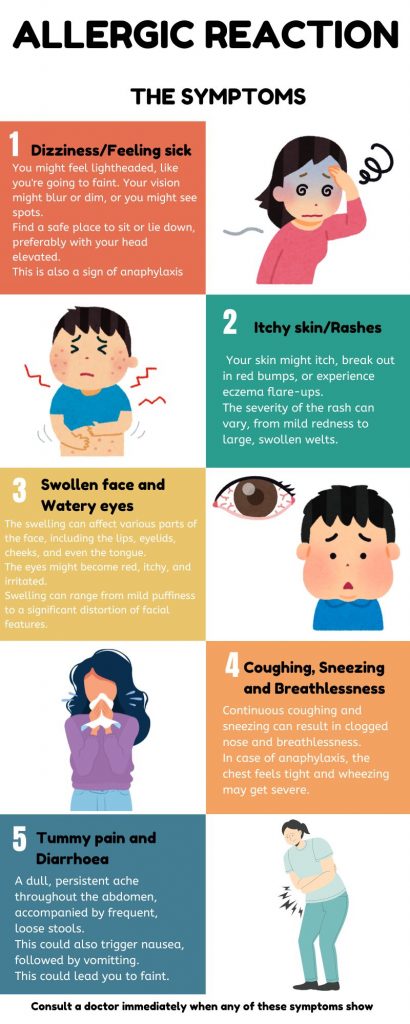May marks Food Allergy Awareness Month, and food allergies are a growing concern, impacting millions. Are allergy sufferers in the UK truly getting the care and support they need to live fear-free?
The restaurant’s room spun, the happy chatter of her colleagues were morphing into a distant hum. Sarah clutched her throat, gasping for air. A single bite of a seemingly harmless sausage roll, a stray mustard seed burrowed within the layers, had triggered a violent allergic reaction. Panic flooded her as her throat tightened, her vision blurred, and the familiar prickling sensation crept across her skin, and she fainted. As she woke up, she realised she was at the hospital. This wasn’t her first life-death experience. Food allergies, a constant companion since childhood, had become an unwelcomed guest throughout her life.
“It’s like playing detective every time I eat out,” she said. “Studying menus, trusting wait-staff, hoping for the best but always fearing the worst. I just want to be able to enjoy a simple meal without fear.” Sarah’s story isn’t unique. May marks Food Allergy Awareness Month, a time to spotlight this growing concern. Yet, for many allergy sufferers, awareness feels like a hollow echo.
According to the Food Standards Agency (FSA), an estimated 1-2% of children in the UK and up to 6% of adults struggle with food allergies, a condition where the immune system mistakenly identifies certain foods as harmful. Unlike intolerances, allergies trigger a potentially life-threatening immune response to specific foods. A single bite of the wrong ingredient can trigger a range of reactions, from mild rashes to life-threatening anaphylaxis.
Sadly, the consequences of these reactions can be fatal. Every year, deaths occur from severe allergic reactions, a stark reminder of the urgency for change. Research by a national charity, Allergy UK, shows that around ten people die each year in England and Wales from fatal allergic reactions.
Their daily reality goes far beyond posters and slogans. Dining out becomes an ordeal, a constant negotiation with wait-staff and a desperate hope for transparency in labelling. “It can be frustrating when people don’t understand the seriousness. I try to educate them calmly, but sometimes it’s easier to just avoid the situation,” says Sarah, who is from Birmingham.

The burden extends far beyond the individual. Every meal feels like a calculated risk, a constant tightrope walk between delicious satisfaction and potential danger. The ever-present fear of anaphylaxis leaves a dark cloud over family outings and celebrations, which takes a mental and emotional toll. Every meal, every social gathering, is a source of low-grade anxiety.
Oli Weatherall, Editor of V-land UK magazine, who lives in Surrey, has a tricky relationship with food. “I had a phase a few years ago where I used to have panic attacks every time I was eating, because it got to a stage where my health got really bad. I haven’t eaten out for years now,” he said.
Travel transforms into a logistical nightmare, with limited safe food options and the constant worry of hidden allergens lurking in unfamiliar kitchens. Social gatherings, once places of joy, morph into potential battlegrounds, where every shared plate carries an invisible risk.
“Travelling can be stressful sometimes,” says Oli, “When I flew to Australia and New Zealand, I remember having to take different flights, and there would only be one airline that would give the peanut allergy announcement.”
The challenge extends beyond restaurants and travel. A common misconception is that allergies are a mere inconvenience, a passing childhood phase, or a fussy preference. People might downplay the severity. This lack of understanding can be frustrating and isolating for allergy sufferers. Empathy and a recognition of the seriousness of food allergies are crucial steps towards creating a truly inclusive environment. “When you are travelling or eating out, you would basically rely on the person in-charge and the other people’s empathy. Their care determines your experience,” Oli said.
For literature student, Mila Thompson, who lives in Manchester, eating at restaurants is a big no, unless she knows the restaurant has specific food allergy standards. She, who is allergic to dairy, eggs and nuts finds it hard to go out without her medicines. “I make sure I always remember to have my Epi-pen and medication with me at all times. This means I can never be out without a bag because I don’t want to be caught having a reaction without my medication,” she says.
However, her restaurant experiences were not always positive. “I was eating at a restaurant where I was told certain allergens were not present in the food only to have a reaction upon eating them. I knew pretty quickly that something was not right and my breathing eventually became difficult,” Mila said.
The current system often fails allergy sufferers. Restaurant staff, while well-meaning, might lack the necessary training to understand and cater to their needs. Cryptic ingredient lists on menus and the ubiquitous “may contain” disclaimer leave room for uncertainty and fear. Even the most sincere assurances can’t guarantee a safe meal, as hidden allergens can lurk in sauces, marinades, or through accidental cross-contamination during preparation. This lack of control and the potential for a severe reaction can turn a night out into a nerve-wracking experience.
Fixing this issue requires a double punch. Waiters and chefs need proper training to spot allergens, avoid cross-contamination, and talk clearly with customers about allergies. Secondly, restaurants need to ditch vague warnings and use clear labels that list all allergens in each dish. This would be a game-changer for allergy sufferers, letting them enjoy a meal out without constant worry.
“Specifying allergy advice with lists detailing what each dish contains would be really helpful for us. It’s even better if the advice also shows what it is cooked with and what may be at risk of cross contamination,” says Mila.

Investment in research is essential for long-term management. Ongoing studies hold the promise of better treatments and potential cures for allergies, offering a future free from constant vigilance.
Palforzia, a recently approved immunotherapy treatment, offers a potential solution for peanut allergy sufferers. This treatment works by gradually increasing the body’s tolerance to specific allergens, allowing patients to consume small amounts of the food they’re allergic to over time. While not a cure, Palforzia offers the possibility of reducing the severity of allergic reactions and easing the constant anxiety that plagues many allergy sufferers.
There is currently a good focus on children with allergies. But what about the adults?
Oli Weatherall, Editor, V-land UK Magazine
The impact of allergies isn’t just about physical safety, it’s about social inclusion and emotional well-being. Children with allergies might feel excluded at birthday parties or school events, hesitant to partake in shared food experiences. Adults with allergies might navigate social situations with dread, constantly evaluating the risk of hidden allergens. Fostering a culture of empathy and understanding is key. Simple steps like offering safe alternatives at gatherings or respecting allergy restrictions can go a long way in making individuals with allergies feel included.
“A big change required is to have an ideal mental health support. There is currently a good focus on children with allergies and the parents of the children. But what about the adults? If there is easier access to specialised mental health support for those with allergies, that could help individuals that are struggling to manage their lives with allergies,” says Oli.
Food allergies are a serious medical condition, not a seasonal concern. By raising awareness, demanding action beyond a single month, and implementing comprehensive solutions, we can create a safer and more inclusive environment for everyone.

The goal is a life less fearful. Imagine a world where restaurants cater confidently to all dietary needs, with menus clearly labelled and staff trained to understand the severity of allergies. Imagine birthday parties where every child can enjoy the celebratory cake without fear. Imagine travel as an adventure, not a medical trip, where exploring new cultures doesn’t come with the constant worry of a hidden allergen.
The road to a truly inclusive environment for allergy sufferers hinges on a shift in public perception. This awareness goes beyond social media posts. It’s about a simple conversation, a neighbour offering to help with a potluck dish, or a friend researching allergy-friendly restaurants. A world where birthday cakes, party meals or a simple snack are a source of joy, not fear. It’s a future where food can be a source of nourishment, celebration, and connection, not a constant worry.
“The more awareness is raised, hopefully the more understanding people will be towards the struggles that can be associated with living with allergies,” said Oli.
With a little empathy and a lot of understanding, the fear of hidden allergens can transform into the joy of a shared meal, fostering a sense of belonging for those who may have previously felt excluded.
“Awareness is growing and research is progressing. There is a lot to be hopeful about. We just need inclusive options and a shift in mindset for a future with better management options,” Sarah says.

